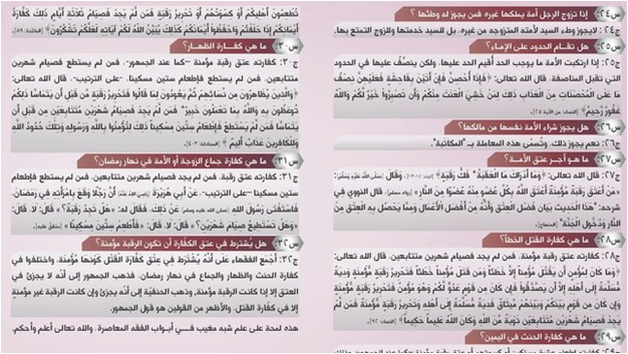ISIS’s Wanton War on Women
In mid-December, at least 150 women and girls, some of them pregnant, were executed for refusing to marry or perform sexual acts for ISIS fighters. The women were systematically shot before being dumped into a mass grave in Fallujah, Iraq. According to regional Iraqi officials, a single ISIS militant, Abu Ana Al-Libi, was responsible for all the executions. Most of the 150 women and girls belonged to the Yazidi religious minority, which ISIS views as heretical.
This horrific incident comes nearly a month after ISIS’s Department of Research and Fatwas published a manual, “Questions and Answers on Taking Captives and Slaves.” The pamphlet was an apparent response to the many questions ISIS fighters posed on burning questions like whether it was OK to have sex with female captives, and the justification for buying, selling and beating these non-Muslim women. One representative section of the translated document reads:
“Question: Is it allowed to have intercourse with a female slave who has not reached puberty?”
“Answer: You may have intercourse with a female slave who hasn't reached puberty if she is fit for intercourse; however, if she is not fit for intercourse, it is enough to enjoy her without intercourse.”

[ISIS manual detailing permissible treatment of sex-slaves]
Personal accounts of slavery under ISIS, as told by women fortunate enough to have escaped, are disturbing. Hannan, a young Yazidi woman who escaped ISIS’s grasp, said ISIS militants denigrated the Yazidi religion. “They said: ‘Yazidis are infidels. Now you will live as Muslims.’ They took many girls for sex. They told us: ‘Forget the life you knew.’” Hannan recalled being sold at a slave market: “They were shooting to scare us. They took whomever they wanted, by force. We were crying the whole time. We wanted to kill ourselves but we couldn’t find a way.”
A report by Amnesty International (AI) tells of slave-girls so traumatized that they were driven to end their own lives. The girls feared rape, forced marriage or being traded amongst ISIS fighters. A Yazidi girl told AI, “[our master] said that either we marry him and his brother or he would sell us. At night we tried to strangle ourselves with our scarves. We tied the scarves around our necks and pulled away from each other as hard as we could, until I fainted.”
ISIS is holding 3,500 Yazidi women and girls captive. These figures, from late December, are based on Yazidi-kept records.
According to Middle East researcher Matthew Barber, ISIS has launched a “21st century slavery project.” In ISIS’s fourth issue of its English-language recruitment magazine Dabiq, the militant group brags about its Yazidi sex slaves, firmly justifying slavery under sharia (Islamic law). The magazine says: “One should remember that enslaving the families of the kuffar (nonbelievers) and taking their women as concubines is a firmly established aspect of the sharia that if one were to deny or mock, he would be denying or mocking the verses of the Quran and the narrations of the Prophet.”
More broadly, ISIS has an abysmal track record when it comes to its treatment of women. According to a U.N. report released in November 2014, women and girls living in ISIS-controlled areas of Syria and Iraq are essentially confined to their houses, “excised from public life.” A female is not permitted to leave the house without a mahram, or male guardian. ISIS’s all-female brigades, Al-Khansaa and Umm Al-Rayan, patrol the streets to enforce a strict Islamic dress code. ISIS dictates every aspect of women’s lives; what they wear, with whom they interact, and where and with whom they work. Indeed, every woman, even Sunni Muslim women, experience a certain type of slavery under ISIS rule.
To enforce its rules for female behavior, ISIS imposes harsh penalties on dissenters. In August, ISIS militants beheaded a female dentist in Syria for continuing to treat male patients. In September, a woman was arrested, detained, and put on trial in a self-proclaimed “sharia court” in Mosul for speaking out against ISIS and “abandoning Islam.” She was tortured and publicly executed.
According to AI, ISIS’s atrocities constitute war crimes and crimes against humanity. It is clear that the women and girls living under ISIS’s rule of terror, whether Sunni or non-Islamic Yazidis, require increased attention and international action.
Stay up to date on our latest news.
Get the latest news on extremism and counter-extremism delivered to your inbox.